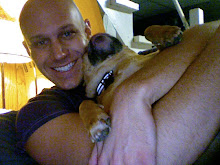Good Writing, Great Writing
A week or so ago, I was watching an episode of one of the Law & Order shows and a criminal had shot up a room full of school children believing that a backfiring car was the police firing on him. When the cops made it into the room, I was shocked to see the bloody bodies of the fifteen 10-year olds. It was something that made me very uncomfortable and slightly distressed. William asked why I was so affected by it - after all, it was only television.
Not for me. To me, it was good writing at work.
I've always been very attuned to the power of storytelling. Great lyrics in a song can be moving; written words properly composed can leave you with bated breath; and an actor following a good script can bring tears to your eyes. For me, all these things are all the more effective.
However, it didn't occur to me until tonight just how powerful great writing really is when it comes to that which I enjoy. I've been watching the first season of The West Wing (again!), and the first season ends with an assassination attempt. The first ten minutes of the second season, however, is where the real emotional payoff comes.
As the show is almost 8 years old now, I have no qualms about spoiling the season premiere of the Emmy-winning show's second season. However, I will say, if you haven't watched it - maybe add the third disc of the first season and the first disc of the second season to your Netflix queue and watch the first season cliff hanger and the second season premiere back-to-back.
The writing in those first few seasons was so amazing that the connections you create to the characters are so strong that when you come back to the location of the shooting and you hear the panic in C.J.'s voice as she asks if the President is dead, you begin to panic with her, even though you know that he's alive in the limo that is on its way back to the White House. When you discover that the President has been shot, you sense the urgency with which the (very well trained) limo driver pulls a U-turn at what's gotta be 60 MPH to send it heading back towards the hospital. But more so, you sense the desperation and fear with which Toby cries out for a doctor when he discovers that Josh has been shot.
Damn ... that's not good writing. That's great writing.
Is it great writing because it's so visceral? It's any "action" sequence - it rides on the adrenaline-fulled emotion of seeing two "bad guys" shoot at a "President." It's television. Maybe.
If you watched the show from the start (or rather, I should say, if you watch the show from the start, as it's no longer on the air), you will have built an emotional connection to the characters. Are you upset because a person got shot? No. You're upset because a good guy who does good things was shot. It's not upsetting because of the act; it's upsetting because the victim was a friend.
That's not good writing. That's great writing.
Not for me. To me, it was good writing at work.
I've always been very attuned to the power of storytelling. Great lyrics in a song can be moving; written words properly composed can leave you with bated breath; and an actor following a good script can bring tears to your eyes. For me, all these things are all the more effective.
However, it didn't occur to me until tonight just how powerful great writing really is when it comes to that which I enjoy. I've been watching the first season of The West Wing (again!), and the first season ends with an assassination attempt. The first ten minutes of the second season, however, is where the real emotional payoff comes.
As the show is almost 8 years old now, I have no qualms about spoiling the season premiere of the Emmy-winning show's second season. However, I will say, if you haven't watched it - maybe add the third disc of the first season and the first disc of the second season to your Netflix queue and watch the first season cliff hanger and the second season premiere back-to-back.
The writing in those first few seasons was so amazing that the connections you create to the characters are so strong that when you come back to the location of the shooting and you hear the panic in C.J.'s voice as she asks if the President is dead, you begin to panic with her, even though you know that he's alive in the limo that is on its way back to the White House. When you discover that the President has been shot, you sense the urgency with which the (very well trained) limo driver pulls a U-turn at what's gotta be 60 MPH to send it heading back towards the hospital. But more so, you sense the desperation and fear with which Toby cries out for a doctor when he discovers that Josh has been shot.
Damn ... that's not good writing. That's great writing.
Is it great writing because it's so visceral? It's any "action" sequence - it rides on the adrenaline-fulled emotion of seeing two "bad guys" shoot at a "President." It's television. Maybe.
If you watched the show from the start (or rather, I should say, if you watch the show from the start, as it's no longer on the air), you will have built an emotional connection to the characters. Are you upset because a person got shot? No. You're upset because a good guy who does good things was shot. It's not upsetting because of the act; it's upsetting because the victim was a friend.
That's not good writing. That's great writing.


0 Comments:
Post a Comment
<< Home